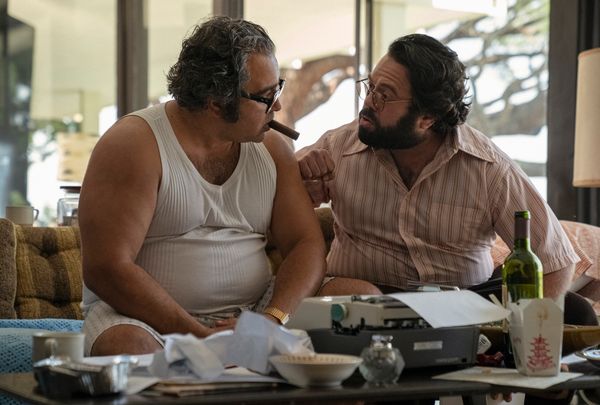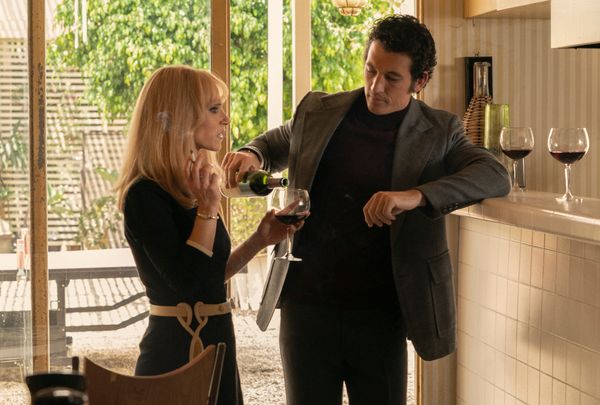
Despite being one of cinema's most influential works, I'm not a fan of "The Godfather" – purely for personal reasons, understand. Never have I questioned its essentiality, and I certainly appreciate the revolutionary cinematic touches Francis Ford Coppola uses to bring the Corleone saga to life. Even so, it has never been one of my central, can't-live-without-it pleasures.
"The Offer," which confuses a baring-it-all origin story with a botched whale flensing, does not substantively change that. However, it deserves credit for elevating my overall esteem for "The Godfather" in one respect: At no point in all of my viewings of Coppola's epic was I ever moved to scream at random intervals, "OH MY GOD, WHO CARES?"
Feeling something for Michael Corleone, Kay Adams and the rest of the main players in Mario Puzo's story is never a problem. But it's amazing that "The Offer" series creator Michael Tolkin neglects this all-important facet of this story, perhaps assuming famous people playing storied producers provides enough gravitational pull to keep viewers interested.
RELATED: The cutthroat casting of "The Godfather"
That could indeed be true for the hardest-core "Godfather" fans and Hollywood trivia specialists. Want to see a modern-day actress swan about as Ali MacGraw? Have at it. (If you just asked yourself, "Who is Ali MacGraw?" then stop reading right and move along; this is your grandpa's jawn, not yours.)
But this tests the average person's fascination with the film industry and its history by forgetting the reason Hollywood exists – which is to generate entertainment.

Theoretically, that makes him the impeccable choice to get into the mindsets of "The Godfather" author Mario Puzo (Patrick Gallo), along with Coppola (Dan Fogler) and all the other personalities linked to the story. But why do that when we can view the film's making-of story from the perspective of producer Albert S. Ruddy (Miles Teller), a guy who made the jump from unfulfilled Rand Corporation drone to become the brainchild behind "Hogan's Heroes"?
There can be value to riding along with the unsung, lesser-known people involved in a renowned true story, of course. Their first-hand accounts have a measure of "they were there" plausibility, which has the bonus effect of lending an air of veracity to whatever narrative embellishments the writers shove into the sauce.
Mainly that works when the unsung subject understands that people aren't necessarily tuning in to see them. If their role is to be a witness and guide for the audience, they stand aside and let the oversized characters drive the narrative. If the production intends to persuade us that we know them better, then he should be written to command our attention.
If the intent is to examine the perpetual tension between art and commerce – as Gallo's author does at the top of the premiere when he's broke and laments, "Hacks sell books. They can pay for the education for their kids," to which his impatient wife replies, "F**k art, Mario. Start typin'!" – there's your first example of how cleverly that plays out.
This tests the average person's fascination with the film industry and its history by forgetting the reason Hollywood exists – which is to generate entertainment.
But Tolkin and showrunner Nikki Toscano don't sufficiently sculpt Ruddy to serve as a load-bearing centerpiece for the story beyond a few too many passages that explain a producer's importance instead of proving it. And Teller, whose capabilities are showcased in better pieces, doesn't justify the story's focus on his producer.
So when Ruddy slides into a production deal with producing giant Robert Evans (Matthew Goode) and talks his way into producing a best-selling novel Paramount has optioned about the mob we're expected to go with it. Now that may be what happened, but that doesn't necessarily make watching that career step and many others worthwhile.
Still, this is Ruddy's take on this game-changer, and since we already know that "The Godfather" will exceed hit status at the box office, this makes Ruddy the stalwart, determined visionary unafraid to lock horns with Evans, who insists gangster films are dead.
Once Evans comes around, mainly in a play to keep his job, the two of them stand together against doubting executives from Paramount's corporate owners Gulf + Western played by Colin Hanks (who portrays Barry Lapidus) and Burn Gorman (cast as Charles Bluhdorn).
And when I refer to the executives butting heads with the artists, I mean over every detail. Some sequences dramatize widely known lore, like the fact that the studio wasn't that hot on Coppola and didn't want Al Pacino or Marlo Brando
From the moment the series opens with the millionth establishing shot of Little Italy's Feast of San Gennaro, and a goon instructs an underling ... to "leave the cannoli," you know this thing of theirs is in trouble.
Simultaneously Ruddy was obligated to calm the actual mob, who were already displeased with Puzo, viewing his mainstream success as an insult and a risk. Once Ruddy gets New York crime family boss Joe Colombo (Giovanni Ribisi) on his side everything is . . . not exactly copacetic. However, it works out precisely and to stereotype in the manner one would expect of any mafia-adjacent venture.
In other words, much of the plot progresses on a raft of threats, interrupted by a shoot-out here and there. Ruddy navigates with threats from studio bosses and mob enforcers. To mix things up a bit, sometimes the mobsters threaten the studio bosses. When that isn't happening the Gulf + Western guys threaten to pull the plug at various junctures when Coppola makes creative choices they don't agree with.
When taking on a story whose outcome is already established and universally known, the script had better be stellar and the performances dead-on. But from the moment the series opens with the millionth establishing shot of Little Italy's Feast of San Gennaro, and a goon instructs an underling passing a table of baked goods to "leave the cannoli," you know this thing of theirs is in trouble.
Want a daily wrap-up of all the news and commentary Salon has to offer? Subscribe to our morning newsletter, Crash Course.
From there we're accosted with an array of faces wearing the skins of Hollywood legends like rented tuxedos, and a slew of jaw-slackening mobster conversations one might charitably describe as a few degrees south of basic, with Ribisi standing out by appearing to portray the mafia's surliest turtle.
Teller ... against all odds works the hell out of a hairstyle that's a centimeter or two shy of a Mike Brady perm-a-fro.
Every heterodox work of art worth celebrating is attached to some fable that involves overcoming pushback, a paucity of faith, and many other unforeseen difficulties. Given the right presentation, they can augment our consideration of the movies we adore or barring that, appreciate (in a whole new way!).

Juno Temple provides a waft of joy as Bettye McCartt, Ruddy's trusted right-hand and a '70s-era stand-in for Rosalind Russell. But seeing her in this amateurishly arranged cock-up only made me yearn for her release back into friendlier and more natural habitats that make better use of her talent.
I submit your time would be better spent watching "The Godfather III" three times in a row than taking in the whole of "The Offer."
I suppose we're supposed to appreciate the similarities between Hollywood's corrupt system and that of organized crime. However – to circle back to the refrain that colored most of my 10-plus hour viewing order – and at some point, you can help but wonder, who cares?
By the way, you read that correctly. For the most part each episode clocks in at around an hour, with the brain-smoothing finale pushing its luck at nearly 64 minutes. Now, 64 minutes doesn't come close to the two-hour, 42-minute runtime of "The Godfather III." However, I submit your time would be better spent watching "The Godfather III" three times in a row than taking in the whole of "The Offer." I don't love that film either, but I appreciate its place in Coppola's trilogy enough understand exactly what that opinion implies.
The first three episodes of "The Offer" are available to stream on Paramount + beginning April 28. New episodes debut Thursdays. Watch a trailer, via YouTube.
More stories like this:







